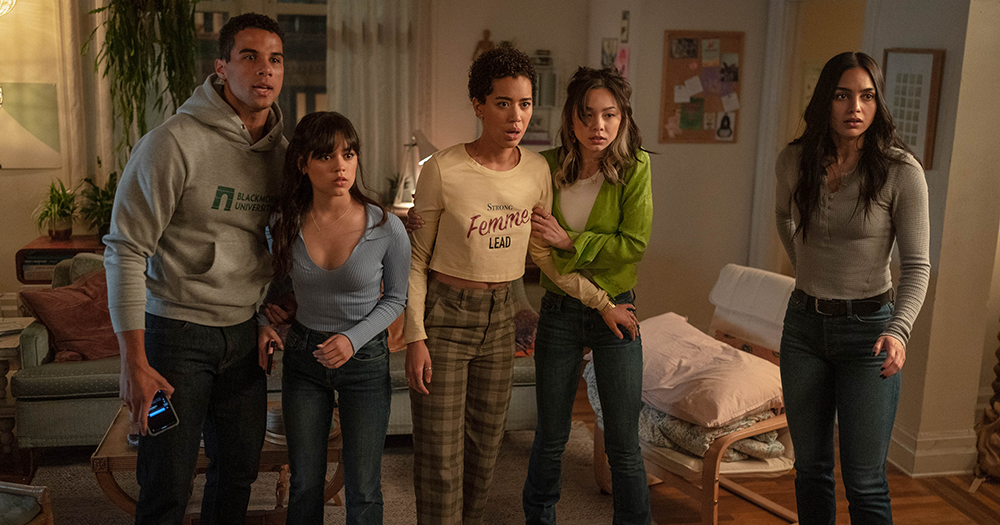Scream 6 has been out for less than a week, and the internet has been abuzz with talk of the movie’s outwardly queer main character and storyline. Released in cinemas across Ireland on March 10, the sixth instalment of the Scream franchise brings Ghostface and its “Core Four” survivors of the last film face-to-face in New York City.
Playing a leading role in the new production, Mindy Meeks-Martin is the first openly LGBTQ+ character to appear in the Scream franchise and the actor who portrays her, Jasmin Savoy Brown, is also queer. Mindy’s character was first introduced in Scream 5, where she survived the 2021 Woodsboro killings and became a member of the “Core Four”, which also includes her twin brother Chad Meeks-Martin (Mason Gooding) and half-sisters Tara (Jenna Ortega) and Sam (Melissa Barrera) Carpenter.
Mindy isn’t just a side character inserted for diversity’s sake; instead, her story takes centre stage and is crucial to the plot. In the case of Scream 6, and much to the delight of LGBTQ+ fans, her arc includes an adorable relationship with her girlfriend, Anika Kayoko (Devyn Nekoda).
mindy and anika were iconic pic.twitter.com/f6jfvtKOel https://t.co/Grg4Jvg8kt
— own?️ (@dsciety) March 14, 2023
The queerness of the franchise is not a new phenomenon. For years, fan theories circulated about the nature of the relationship between Stu and Billy, the original Ghostface killers from the first film.
Original Scream screenwriter and creator Kevin Williamson is openly gay and has spoken about the queer coding of the films in the past. In a 2022 interview, he even said that Stu and Billy are based on 1920s gay mass murdering couple Nathan Freudenthal Leopold Jr and Richard Albert Loeb. “It’s very sort of homoerotic,” Williamson told PrideSource.
Although Williamson certainly made some Scream fans happy with his support of their theory, it shows the broader issue of movie creators falling to queer coding instead of having openly LGBTQ+ characters. Scream 5 and now Scream 6 divert from this hole and finally bring queerness to the forefront of the famous slasher series.
woke up to scream 6 getting excellent reviews and people calling it the darkest and goriest entry in the franchise I KNOW THAT’S FUCKING RIGHT! pic.twitter.com/uRF6pdTgOc
— gabe (@poetsonfilm) March 4, 2023
Scream 6 not only gives us a queer main character in the form of Mindy, but it also diverges from the infamous ‘Bury Your Gays’ trope in cinema.
‘Bury Your Gays’ first began as a literary trope in the 19th century to allow authors, particularly LGBTQ+ authors, to write queer characters without facing backlash because of morality laws. In literature, this cliché takes the form of a queer relationship where one individual is killed or becomes evil right after the coupling is introduced.
This trope continues in modern-day media, particularly in film, where queer characters are killed soon after being introduced, especially in horror movies. Some examples include Big John and Little John, a gay couple in the film Halloween Kills, and It: Chapter Two, which included an unnecessarily graphic opening scene of a gay couple being attacked by homophobes.
That’s not to say that all horror films perpetuate harmful tropes and queer-coded characters. GCN has previously compiled a list of some amazing horror movies that feature queer women characters, and we’re sure these newest Scream instalments could fit right in.
© 2023 GCN (Gay Community News). All rights reserved.
Support GCN
GCN is a free, vital resource for Ireland’s LGBTQ+ community since 1988.
GCN is a trading name of National LGBT Federation CLG, a registered charity - Charity Number: 20034580.
GCN relies on the generous support of the community and allies to sustain the crucial work that we do. Producing GCN is costly, and, in an industry which has been hugely impacted by rising costs, we need your support to help sustain and grow this vital resource.
Supporting GCN for as little as €1.99 per month will help us continue our work as Ireland’s free, independent LGBTQ+ media.

comments. Please sign in to comment.